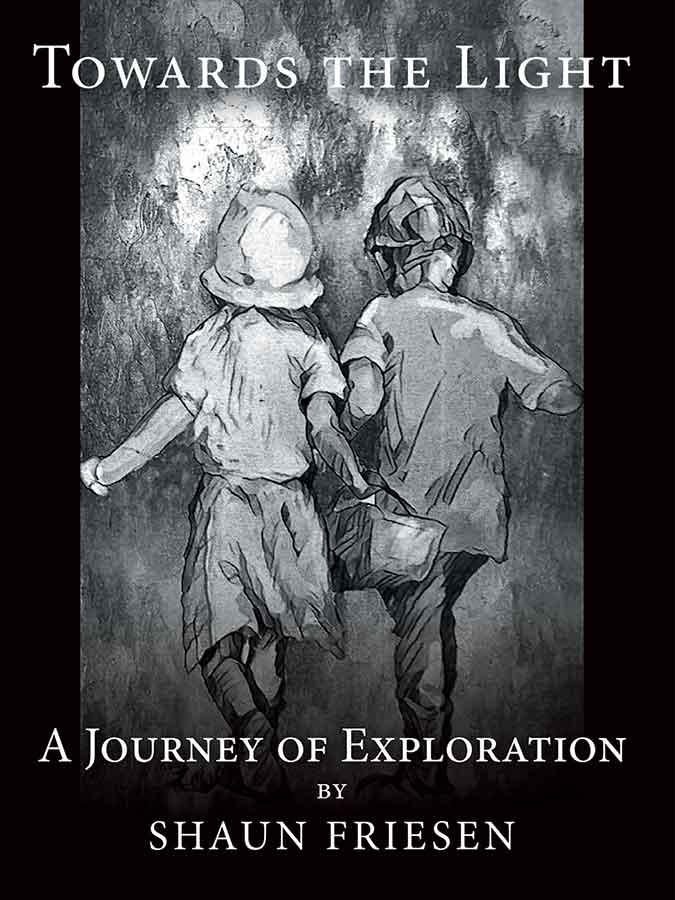When Shaun Friesen gathered with 70 people at a book launch this past June, the evening was more than just the unveiling of a poetry collection.
In a hall in Neubergthal, a live band played music connected to his poems, while guest readers read selections from the collection chosen for their personal connections. Across the room, memories that spanned generations were shared aloud.
“One of the features of the book is that it has sort of its own soundtrack,” Friesen explained. “Some of the poems have rock and roll lyrics embedded in them, and there’s a soundtrack page that tells you what song it is and the artist. You can go on Spotify and listen to all of this. I think that adds something pretty unique, because poetry carries emotion, but so does music.
“We also had a band that played parts of the soundtrack,” Friesen said. “And I brought in some guest readers. We had eight or nine guest readers, all of whom had connections to the poem I asked them to read. So that was really good.”
That launch marked the beginning of a public journey for a project that had taken Friesen nearly two years to complete. His debut collection weaves together history, memory, and cultural identity in a way that feels both personal and deeply tied to the community.
This September, Friesen will bring the book back home, reading at four branches of the South Central Regional Library: Manitou on Sept. 16 at 6:30 p.m., Morden on Sept. 18 at 7 p.m., his home branch in Altona on Sept. 23 at 7 p.m., and Winkler on Sept. 25 at 7 p.m.
A voice rooted in place
Friesen was born in Gretna and has lived most of his life in the Altona area. His sense of place, of belonging in southern Manitoba forms the foundation of his poetry.
“It’s about the big story,” he explained, “but it’s created by telling the small stories—about the people, about the journeys, and some of them are personal.”
The collection traces the journey of Mennonites who left Russia in 1874 and resettled in Manitoba. Friesen structured it in three parts: the conditions in Russia before departure, the arrival and early years in Manitoba’s East and West Reserves, and reflections that tie history to his own lived experiences.
“Basically, 3,000 people moved in the space of three years, picking up everything they could carry,” Friesen said. “It was a unique journey.”
History provides the backdrop, but poetry gives him a way to capture how people experienced it in everyday life. Some poems speak directly to historical events. Others arise from memory, from the quiet moments of community life.
One poem, Swampstock, tells the almost-forgotten story of a rock festival near Niverville in 1970. Intended as a fundraiser to purchase oxygen equipment for a young woman injured in a hayride accident, the festival drew 10,000 people and even featured a surprise performance by Burton Cummings. Heavy rain turned the site into a mud swamp, but local farmers arrived to tow cars from the muck. In the end, the event raised $10,000, funding a U of M scholarship that still exists today. The scholarship supports additional training for trauma nurses.
“Nobody knows about that story,” Friesen said. “So I wrote a poem about it.”
Another poem revisits a darker chapter: The 1903 shooting in Altona, when a teacher opened fire on three students and three trustees after a dispute, killing one girl.
Other poems reflect on the controversy surrounding the Mennonite Collegiate Institute (MCI), which was secretly moved overnight to Altona after a dispute over its location, or on the church divisions that fractured villages.
“This isn’t a book to celebrate Mennonite triumphalism,” Friesen observed. “It’s a hardcore look at who we were.”
That honesty resonates with readers who see both the positive and difficult parts of their shared past. Some poems stir pride and fond memories, others confront painful truths, but together they invite reflection and dialogue.
The book also highlights everyday people who left a lasting impact. A section on women honours Friesen’s aunt, a neighbour, and his best friend’s mother.
“For me, it was a lot of really amazing women,” he said. “Those poems capture those people in a way that many can relate to—they can say, my mom was like that, my grandmother was like that, my aunt was like that.”
Friesen’s poetry also captures community through sports and youth culture. One vivid poem recalls a Mennonite Mexican teenager who joined Friesen’s hockey team as goalie—playing in winter boots because he had never skated. He backstopped the team to a championship. Another memory recalls foster children and adoptees from Indigenous communities, linking local sports stories to the wider history of the Sixties Scoop.
Faith and cultural change are also key themes in the book. Friesen writes about the tent revivals of the 1960s and the “Jesus Freak” movement of the 1970s, when a coffeehouse called The Lighthouse in Altona became a hangout for youth. The “Jesus Freak” movement was part of a broader evangelical wave across North America, blending rock culture with Christian outreach.
Relationships and family ties are another recurring theme in Friesen’s work.
“In Mennonite culture, we don’t tend to talk about those things,” he said. “But it’s the way women cared for their children, and grandmothers cared for their children. It’s the soft part of the relationship, not their ideology of faith, that made this all work.”
What makes the collection stand out is its multimedia approach. Many poems include lyrics from the rock music Friesen grew up with.
“I am hopelessly lost in the music of the ’60s and ’70s,” he admitted with a smile. “Poetry carries emotion, but so does music. So, I embedded some lyrics, and there’s a soundtrack page that lists the songs.”
The book also features original artwork by Ray Kehler, a print artist at Martha Street Studio in Winnipeg and Friesen’s friend since childhood.
“Every image in that book, including the cover, is his,” Friesen said. “They’re crafted for this book.”
With readings planned across the region this month, Friesen hopes the book will continue to spark curiosity and conversation.
“Most people don’t read poetry,” he said. “If this helps people become more curious about poetry, that’s great. And if they can see the story elements and connect to them, that makes meaning in a variety of ways.”
Above all, he hopes the poems remind people of the value of art itself.
“Ray’s artwork is powerful and stunning, the music is there, the words are there. I hope it just kindles in people to say, you know what, the arts matter.”
As Friesen reflects, it is the small stories that make the big story: The rock concerts and school shootings, the hockey games in boots, the grandmothers and mothers, the faith and the fractures. Poetry, he believes, can carry them all.
“It’s about the big story,” he said, “but created by telling the small stories. And that’s how we find meaning.”


